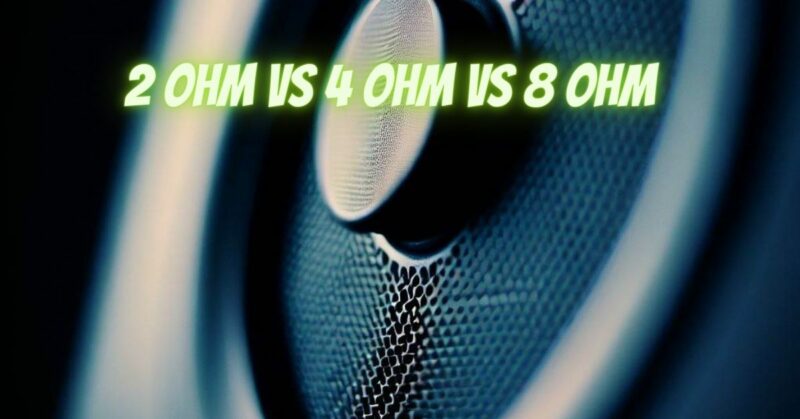The world of audio systems is a symphony of choices, and among the critical decisions is selecting the right speaker impedance. 2-ohm, 4-ohm, and 8-ohm speakers are common options, each with its own sonic characteristics. This article aims to provide clarity by comparing 2-ohm, 4-ohm, and 8-ohm speakers, helping you make an informed choice based on your audio preferences, amplifier capabilities, and listening environment.
Understanding Speaker Impedance
Speaker impedance, measured in ohms, represents the electrical resistance a speaker presents to the amplifier. It’s a fundamental parameter that affects how power is distributed, sound quality, and the interaction between speakers and amplifiers.
2-Ohm Speakers: Power and Intensity
2-ohm speakers have a lower impedance, meaning they draw more current from the amplifier. This can result in increased power output, delivering impactful and dynamic sound. They are often favored by enthusiasts seeking high-power audio systems, such as car audio setups or powerful home theater configurations.
4-Ohm Speakers: Balance and Versatility
4-ohm speakers strike a balance between power and compatibility. They require less current than 2-ohm speakers, making them a more versatile choice for a range of amplifiers. 4-ohm speakers are common in home audio systems, studio monitors, and home theater setups.
8-Ohm Speakers: Compatibility and Fidelity
8-ohm speakers offer a higher impedance, requiring even less current from the amplifier. They are highly compatible with a wide range of amplifiers and are often chosen for their ability to reproduce audio with fidelity and clarity. They’re suitable for both entry-level and high-end audio systems.
Amplifier Considerations
When comparing 2-ohm, 4-ohm, and 8-ohm speakers, consider your amplifier’s capabilities:
- 2-Ohm Speakers: Require an amplifier capable of delivering higher current for optimal performance. Suitable for high-power setups.
- 4-Ohm Speakers: Compatible with a broader range of amplifiers and configurations. Offer a balance between power and stability.
- 8-Ohm Speakers: Highly compatible with most amplifiers. Ideal for setups prioritizing fidelity and versatility.
Listening Environment and Application
The choice between these speaker impedances should align with your audio setup:
- 2-Ohm: Best suited for powerful audio setups, car audio, or applications where maximum impact is desired.
- 4-Ohm: Versatile for home audio, home theater, and studio setups, offering a blend of power and compatibility.
- 8-Ohm: Ideal for applications focusing on accurate sound reproduction and compatibility across various amplifiers.
Sound Quality and Impedance
Remember that while impedance is a factor, other elements such as speaker design, quality, and amplifier matching play crucial roles in sound quality.
The choice between 2-ohm, 4-ohm, and 8-ohm speakers depends on your audio goals, amplifier capabilities, and intended use. 2-ohm speakers provide power and intensity, 4-ohm speakers offer balance, and 8-ohm speakers emphasize compatibility and fidelity. Evaluate your setup, amplifier, and preferences to select the impedance that delivers the best audio experience for your listening pleasure.


